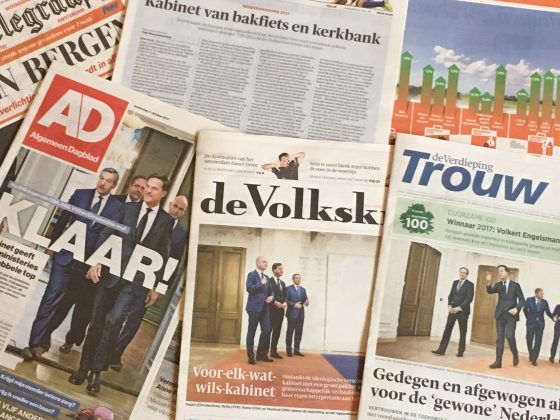The new Dutch coalition is a marriage of convenience, say the leader writers
 The Dutch papers and opinion pages are quick to describe Tuesday’s coalition agreement as a document full of compromises, and one born out of necessity rather than real conviction.
The Dutch papers and opinion pages are quick to describe Tuesday’s coalition agreement as a document full of compromises, and one born out of necessity rather than real conviction.
After 209 days, the finalised document presenting the next government’s main policies, offers little in the way of inspiration, the NRC said in its editorial, which called the new coalition a ‘cabinet of cargo bike and church pew’.
The four parties are not forming a coalition of conviction but a forced relationship. ‘The result is a soulless contract full of pluses and minuses for each of the parties involved,’ the paper states.
In terms of the actual content, the parties have the luxury of a budget surplus to play with, a situation that has not arisen since 1959. ‘That is why there is more money for defence, education and the climate without the need for swingeing cuts elsewhere,’ the paper says. ‘More than that, there is also room for tax cuts, which will benefit people in work in particular.’
Nevertheless, the new coalition has not dared to implement a major overhaul of the tax system, although the decision to shift taxes from work to consumption and the changes to mortgage tax releif ‘are hopeful steps’. The VVD, CDA, D66 and ChristenUnie, the NRC says, are entering a marriage of convenience.
‘This, as we can see from the coalition accord,’ is delivering a government of small steps… as we are used to in the Netherlands. Nothing spectacular but hopefully effective.’
Born out of need
Raoul de Pre and Robert Giebels point out in their analysis in the Volkskrant that Rutte’s ‘normal, ordinary Dutchman’ is someone with a job that pays a decent salary and a familiy.
Describing the coalition as one born out of need, they point out that each of the four party leaders has made their own contribution to the coalition agreement: ‘The VVD’s Rutte gets tax cuts and security, CDA leader Buma gets to ‘strengthen the feeling of belonging’, D66’s Pechtold has climate and education while ChristenUnie’s Segers gets families, defence and development aid’.
Civil service advice
The Financieele Dagblad too describes the new coalition as a marriage of convenience, but one which shows the signs of being based on solid civil service advice and financial discipline.
‘The new cabinet has been forced to take the middle path,’ the paper says, pointing out that the one seat majority in the lower house demands a ‘clever balancing act’.
‘Necessary labour market, housing and pension reforms plus a strong climate policy have to go hand in hand with the recovery in essential government areas, such as education and the armed forces,’ the paper says. ‘But the challenge is in giving the middle class more trust in the future, as the agreement’s title states.’
Self-employed
The Telegraaf also highlights the the step by step approach to reforming the pensions and labour market system, but is quick to praise the new coalition for being prepared to tackle the thorny issue of freelancers.
‘The cabinet is quite correct to state that the freelancer who works for €15 an hour is no entrepreneur,’ the paper states. ‘This worker with no rights deserves a pension and protection. The limit is arbitrary but the message is clear.’
Four shades of blue
‘So there they were. Rutte, Buma, Pechtold and Segers. Four shades of blue, four boring ties,’ writes Marc Chavannes in De Correspondent, before going on to describe even the introduction to the coalition agreement as ‘a collage’ rather than a document.
What is notable, he said, is that ‘Rutte III is going to soften or reverse a lot of Rutte II’s policies.’
‘Of course, no-one is going to state that too loudly… it would be tricky for a prime minister who is staying in the job.’ However, ‘previous cuts on defence, diplomatic posts abroad, culture, sheltered work schemes… they are all being at least partly reversed ‘without any admittance of guilt, without admitting the damage caused ahas been bigger than the benefits.’
‘Even the attacks on development aid are being partially repaired. And that gives reason for optimism, because almost everything about the Netherlands and its position in the world refers to reducing migration towards Europe.’
Thank you for donating to DutchNews.nl.
We could not provide the Dutch News service, and keep it free of charge, without the generous support of our readers. Your donations allow us to report on issues you tell us matter, and provide you with a summary of the most important Dutch news each day.
Make a donation